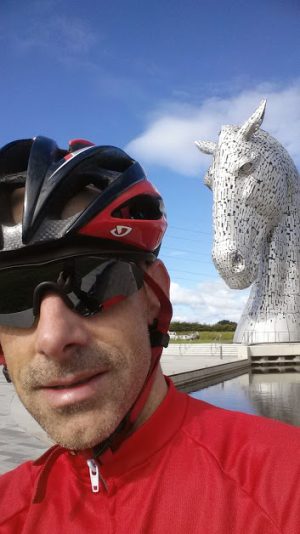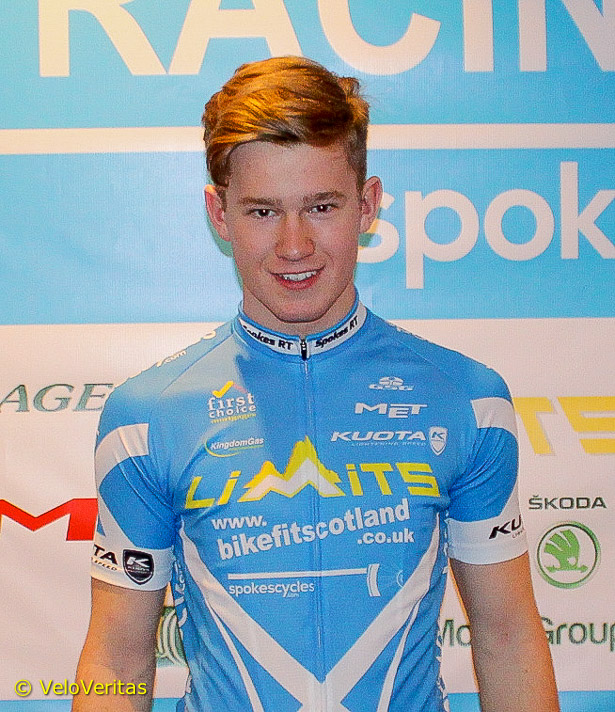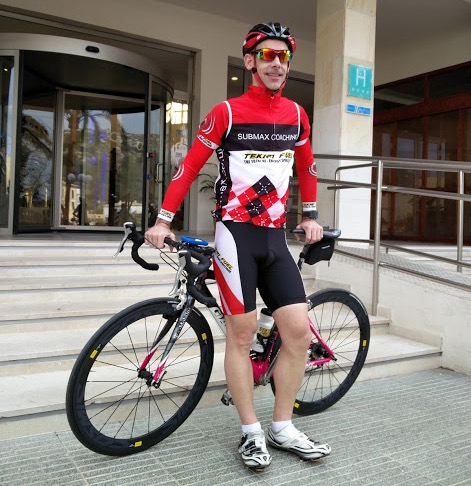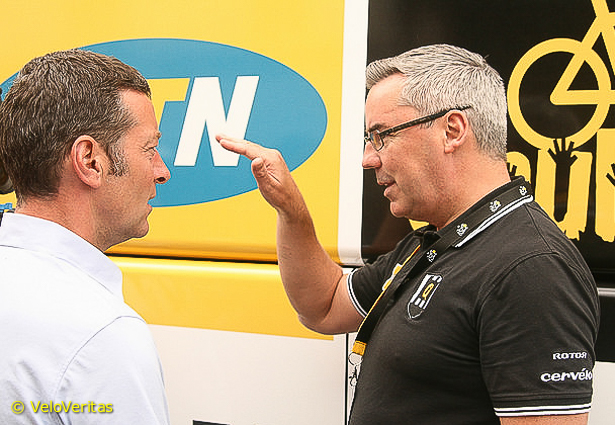
It’s not often we have a professor in the pages of VeloVeritas but that’s exactly what Richard Davison is; as well as Assistant Dean (International) at the University of the West of Scotland.
He was also instrumental in the setting up of British Cycling’s current coaching system and does ‘one on one’ coaching with riders.
Richard was also a successful rider on the Scottish scene a year or two back – and that’s where our interview starts:
Thank you for speaking to us, Richard please remind us of your Scottish results.
“I won the Scottish BAR twice, won the 12 hour twice and was second twice.
“I used to come up from England for two weeks and fit in a ‘100,’ a ’50,’ and the ‘12’ – that was my BAR bid for the year.”
How long have you been coaching?
“I got my first coaching qualification in 1989 not long after my first degree, I did a masseur’s course and part one of that incorporated the coaching course.
“In 1999 I interviewed for the post of BC head coach, it was John Mills who got the job – he’s now Director of coaching, education and development – but not long after that I received an email from him asking me if I’d like to be involved in setting up the new coaching system.
“I wrote some original material and I was involved from day one with the first coaching course within the new system in 2000.
“Teaching new coaches may not be in the limelight but it’s very satisfying and whilst it’s not recognised, there’s a whole army of people out there qualified to coach and it’s one of the reasons for British Cycling’s success.”
So you have three involvements?
“Yes, there’s my University post, British Cycling and my own coaching which goes back to 1994 when I coached the Riddle Brothers for the Commonwealth Games – I’ve coached riders ever since.
“I remember Brian Smith not being impressed by my ‘heart rate’ training programmes for the ’94 Commonwealth Games but then coming to me and asking me for one for the ’96 Olympics.
“I’ve coached four riders to British Championships but also get a lot of satisfaction out of seeing riders achieving goals – setting personal best times, for example.
“That side of things is quieter now because I spend so much time travelling with my job – that sounds glamorous but when you’ve seen one airport…”

So you coach at all levels?
“From club guys to internationals; really varied, one of my clients was Malcolm Whitehead who was top ten in the BBAR, a silver medallist in the 12 hour champs and 24 hour champion.
“In fact the data I gathered from coaching and helping Malcolm in his ‘12’s’ I used to train and race my first ‘12’ up at Aberdeen which I won.
“I also coach Matthias Barnet who won the British Under 16 Criterium Championship in 2014.”
The big change in coaching in our time has been the move from heart rate to power – Powertap or Power Cranks?
“I think now you should never train or race without monitoring your power – the problem with the Powertap hub is that you’re limited to that one wheel – the SRM system is much more flexible.
“I know Uli Schoberer, the inventor of the Power Crank well; I’ve been to the factory, and all the other systems on the market make things more competitive and lead to improvements – which can only be a good thing for the end user.
“Heart rate-based training is OK and ‘back in the day’ it was the best we had but it has limitations, for instance, if you’re training in cold conditions that affects heart rate straight away.”
What’s the biggest mistake riders make in their training?
“Not being specific enough, I mean general ‘riding a bike’ is OK but you need to look at what you’re going to be riding – MTB? Road? Track? Set realistic goals then work back from them with a programme which works back from them.
“When I won the ‘12’ I prepared for it but never rode anything like 12 hours in training.”

The glossy mags are full of different ‘training advice’, how do we avoid getting confused?
“My basic philosophy is that we’re all individuals – If I gave the same programme to 20 riders you’re guaranteed that they’d all react differently to that.
“If you’re a coach then you have to get to know your rider, see what works for them, understanding their life – do they have children? Do they work shifts? If they’re professional people then their time may well be restricted. What are their ambitions? What’s feasible within their lifestyle? How does their body react to training?
But the impact of improving technique and tactics can have a more significant impact upon performance than physical improvement – take a criterium rider, if you can improve his cornering abilities then that’s a ‘free’ improvement without any extra training.”
How many ‘peaks’ can a rider realistically achieve in a season?
“Two, perhaps three, depending on what the events are and where they’re placed within the season.
“I say to my riders to name their two priority events then their second most important two races then third most important – what you can do then is to use the second and third string goals as stepping stones to the main goals.”

What’s next in coaching/training?
“In the last 15 years training has become much more scientific, time trials have become faster and faster – albeit a lot of that is due to equipment and position.
“Road racing has perhaps regressed because of the clampdown on doping – Armstrong’s performances were super-human.
“And of course there’s the team dynamic in road racing, especially at professional level where you can’t win if you don’t have support riders in place.
“Personalised coaching employing genomics is the coming thing – analysing your blood can tell you a lot about what you’re going to be capable of.
“It can guide what kind races you concentrate on and what sort of training you should be doing.
“There’s no point in you training to be a pursuiter if your make-up is that of a sprinter – it’s about your response to training.
“It’s similar in philosophy to precision medicine which is an emerging approach for disease treatment and prevention that takes into account individual variability in genes, environment, and lifestyle for each person.
“This approach will allow doctors and researchers to predict more accurately which treatment and prevention strategies for a particular disease will work in which groups of people.
“It is in contrast to a “one-size-fits-all” approach, in which disease treatment and prevention strategies are developed for the average person, with less consideration for the differences between individuals.
“It’s a huge area.”
Plenty of food for thought there – with thanks to Richard for his time and insights.



